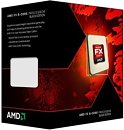Thursday, December 27th 2012

AMD FX-8300 Starts Selling, Lower TDP Comes at a Price
AMD started selling its FX-8300 eight-core processor, which has been in the news since early-November. The new chip comes with a relatively low TDP of 95W, compared to other eight-core FX "Vishera" processors, which ship with 125W TDP. Despite being slower than the other FX "Vishera" chips, the FX-8320 and FX-8350, its low-TDP appears to have given AMD a big enough selling point, to price the chip around $190. Based on the 32 nm "Vishera" micro-architecture, the AMD FX-8300 ships with a clock speed of 3.30 GHz, 3.60 GHz of TurboCore speed, eight cores spread across four modules, 2 MB L2 cache per module (8 MB total), and 8 MB shared L3 cache.
Source:
Expreview

97 Comments on AMD FX-8300 Starts Selling, Lower TDP Comes at a Price
If you had two employees sharing a telephone, would you call them one employee? Obviously not. The fact that they have to share a telephone might imply that they could be half as productive as a single employee with their own telephone, but in the world of microprocessors, it doesn't work like that. Most of the time, there will not be any significant contention. Yes, you can construct a scenario where the contention will be higher (both employees are telemarketers), but the actual scenario in daily computing is more like two employees who only occasionally want to use the phone at the same time. You can also think of two homes sharing a driveway. If the driveway is badly designed, it will be only one lane wide, and you'll have to wait for your neighbour to move his car for you to get in or leave quite often. However, if the driveway is two lanes wide, you'll never have to contend with your neighbour to use the driveway, but you might have to move your car for your wife to get in or out. If you make the shared driveway 4 lanes wide, you eliminate this problem, etc., so even though there's 'only' 1 driveway shared between two houses, it could be virtually irrelevant depending on how intelligently the shared driveway is designed. So, moving on.
So here's the simplest explanation of what's going on in a CPU. CPUs only really do one thing: add. They add 1s and 0s VERY, VERY, VERY quickly. Furthermore, every mathematical operation ever performed in a CPU (addition, subtraction, multiplication and division) is performed by adding (eg. 6x6 would be 6+6+6+6+6+6=36. 6-2 would be 6+(-2)=4). OK, got your mind around that? Great.
Next, CPUs can add integer numbers (those without decimals like '24') and floating point numbers (those with numbers after the decimal point like '3.141592658'). If you ask a CPU to add integers, the 'integer' unit(s) do it (and these are what are mainly improved when we look at generational 'core' upgrades - Pentium II to Pentium III, AMD K6-2 to K7, etc.). However, if you ask a CPU to add floating-point numbers, several possible things can happen. In the past (since the 386DX - before the 386DX, you'd need a separate x87 co-processor chip, or your integer-only CPU would have to emulate an x87!), a floating-point calculation would be done by the x87 floating point unit inside the CPU. However, CPU engineers came up with all kinds of different ways to speed up floating-point calculations, depending on what kind of sequence of calculations you were wanting to perform. AMD came up with 3DNow! and Intel came up with SSE to supplement the old x87 unit. Nowadays, programs can be designed to package floating-point calculations as SSE/AVX/FMA or even GPU-coded (Direct Compute, PhysX) operations, completely bypassing the x87 unit. At first, this was done for games, heavy math and scientific computing programmes, but now, with tools like OpenCL, etc. just about any floating-point can be directed to the fastest hardware available on a given computer. The programme detects OpenCL-compatible hardware, and installs the OpenCL version of the code. In short, only older programmes rely solely on the legacy x87 unit, and that's why AMD decided to cut down the number of x87 units to 4 in an 8 integer core CPU so they could add more integer cores - cores that are still the best way to add integers! Any decent programmer worth his salt writing fresh code today that's performance-sensitive will be coding the floating-point to execute as AVX/FMA or GPU-accelerated code, unless they absolutely can't (very rare). Otherwise, they're coding for a 15 year old processor. Period.
I know it's hard because AMD's module design doesn't cleanly fall into a single or dual core classic case design scenario, but really, we've got to learn to accept a little bit of complexity and stop trying to over-simplify everything, even when it means we end up being highly inaccurate. Simple bottom line, AMD's 8 integer core CPUs, based on contemporary, multi-core optimzed code, is much more like an 8 core CPU than a 4 core CPU, most of the time, in most use cases. End of story.
So yes, AMD runs in parallel, yes there could be performance losses in special cases, but no, it doesn't bottleneck on shared components like you're suggesting. Using that argument, you could say, "Intel CPUs are slow because hyper-threading is sharing the entire core," as opposed to AMD's sharing only part of the "module" (mainly decoders, branch prediction, and cache) because the entirety of the integer cores and FP cores themselves are not shared.
The "one phone two employees" analogy is ok, if you add something else to the analogy. Suppose each employee answers the phone and an equation is given to him to solve. then he calls back to give the answer to the problem.
In this case even if the phone is busy, the employee would be breaking his brain trying to solve the equation. Once solved the employee waits for the phone to be available to call back and give the answer.
Today a CPU can be considered A core and/or a Quad-Core and/or a 8-Core depending on the design. INTEL approaches this differently than AMD. Both are not right and both are not wrong.
This notion about AMD's 8-Core CPU's are not 8-Cores is getting rather old. It's as much an 8-Core as any other 8-Core CPUs.
Next AMD has hired an investment bank to "explore options". Hmm... wonder what those options could be.
AMD is currently lagging far behind Intel in production cost due to old technology. Furthermore, they are so far away from full fledged 22nm production. They don't even have money to invest in further R&D.
At least, that is what I recall from some review on it, LOL!
But I don't buy all the DOOM & Gloom. They should recover, and so long as they continue to pump out products, they will. You also cannot compare AMD with INTEL, even in the past with AMD's great Hammer Architecture, they were always behind INTEL by at least 18 Months, and they continue to fall behind, there is no question about this fact, and this is all due to the FACT INTEL can afford to make mistakes, where as AMD really cannot.
Is Bulldozer a mistake? Well yes and no, if only the BOD would have listened to the CTO in charge of CPU design, Bulldozer would have been implemented differently with a substantial performance boost in both speed and energy efficiency while making it easy to add new cores.
Right now AMD is back-peddling and trying to make things right because of the past messup(s). All we can do now is buy the best price/performance products regardless of company. For me anyway, I find great value and longevity with AMD hands down. :D
I rather buy a ASUS ROG high end mobo ($250) based on AMD versus an INTEL based that costs $200-$300 more. An equivalent priced INTEL mobo for $250 sux IMO.
Great points, to sum it all up AMD's upper management throughout the years have F'ed up. And now we all hope AMD pulls a bunny out of its hat and gets back into strong competition for the sake of competition and prices.
AMD was crushing Intel since 1999, during the original Athlon, Athlon Thunderbird, Duron, Sempron, Athlon MP, and Athlon XP (Palomino, Thoroughbred, Thorton and Barton).
www.theregister.co.uk/2010/07/26/after_the_dell_settlement/
for years and years to not sell AMD, I'd just rather not support a company like that. Intel 'denies any wrongdoing' and then gives AMD a billion dollars out of court (which doesn't begin to make up for what AMD lost in terms of opportunities) and we're supposed to believe they didn't do anything wrong? NO COMPANY PAYS OUT A BILLION DOLLARS WHEN THEY HAVEN'T DONE ANYTHING WRONG. They can have the best goddam CPUs in the universe, and I will not buy them. I'm voting with my $$ for a more ethical company, thank you very much. I'm not going to pay a company that uses mafia-style extortion tactics to compete. Forget it.
On another note, actually, ECS is a big pile shit. The very, very, very worst motherboards of all time. I had one that died within a week or so of buying it. Subtle corruption and then capacitors that started to burst not years, but days later. I don't care if TechPowerUp recommended it or not. I will never buy another ECS motherboard as long as I live.
In other words, if INTEL played fair and did not commit to these blasted shenanigans, AMD today would have most likely been a different company. Perhaps a stronger competator, stronger more vibrant R&D etc., INTEL not only played unfair, they copied AMD's progression in CPU enhancements such as the IMC, HTT, 64-bit, on die L2 cache etc.
The only difference was INTEL had the massive resources, budget & huge R&D.
I guess we should thank AMD for the Core Architecture INTEL devised, by screwing AMD.
I buy 95% AMD CPUs/GPUs to support them and also best value for money. If somebody is stealing food from my plate I will be aggresive not cry like a baby. Part of the blame is on AMDs part too.
Anyway 95W 8 core CPU is interesting, tho I would just underclock and undervolt to conserve energy if I don't need that much power (I do on my servers).
yay, 5K+ posts :rockout:
Glad to hear you've had good luck with ECS. You're right that practically every company has ba batches. I once had 3 defective Asus boards in a row back in 2004. Right now, I'm sticking with Gigabyte, although their 990FX-UD3 was disappointing due to the ridiculously inadequate north bridge cooling. I went with a UD7 Rev. 1.1 and it's stellar in every respect.
As far as being aggressive with somebody stealing food from your plate, that's easy to say, but what could AMD really do? Send a covert ops team into Intel headquarters and kidnap some execs and hold them hostage until Intel stopped bribing Dell and threatening Toshiba and all the other computer manufacturers? The legal response took years and in the meantime, the damage was being done. Face it, sometimes WE as people have to notice an injustice and DO something about it when the 'normal' channels can't/won't work.